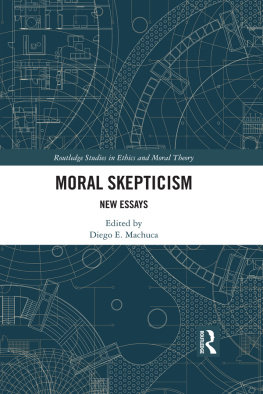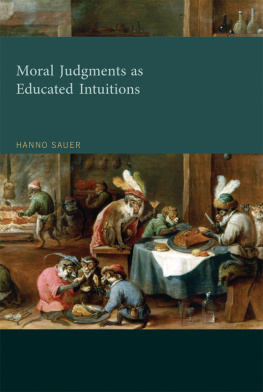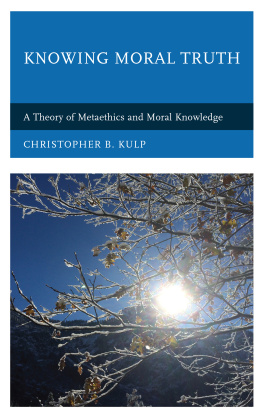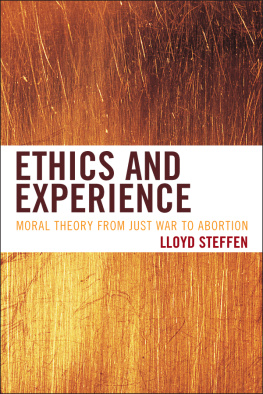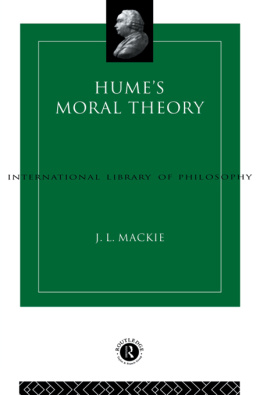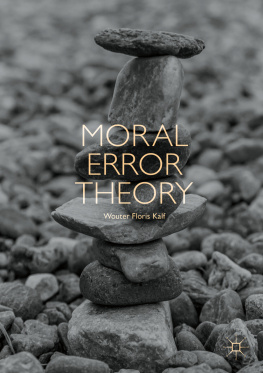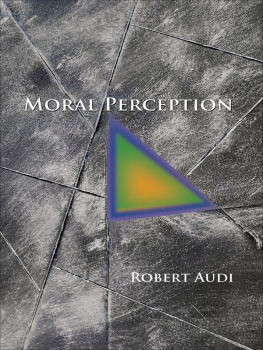Moral Error Theory
Moral Error Theory
History, Critique, Defence
Jonas Olson


Great Clarendon Street, Oxford, OX2 6DP,
United Kingdom
Oxford University Press is a department of the University of Oxford. It furthers the Universitys objective of excellence in research, scholarship, and education by publishing worldwide. Oxford is a registered trade mark of Oxford University Press in the UK and in certain other countries
Jonas Olson 2014
The moral rights of the author have been asserted
First Edition published in 2014
Impression: 1
All rights reserved. No part of this publication may be reproduced, stored in a retrieval system, or transmitted, in any form or by any means, without the prior permission in writing of Oxford University Press, or as expressly permitted by law, by licence or under terms agreed with the appropriate reprographics rights organization. Enquiries concerning reproduction outside the scope of the above should be sent to the Rights Department, Oxford University Press, at the address above
You must not circulate this work in any other form and you must impose this same condition on any acquirer
Published in the United States of America by Oxford University Press
198 Madison Avenue, New York, NY 10016, United States of America
British Library Cataloguing in Publication Data
Data available
Library of Congress Control Number: 2013950750
ISBN 9780198701934
Printed and bound in Great Britain by
CPI Group (UK) Ltd, Croydon, CR0 4YY
Links to third party websites are provided by Oxford in good faith and for information only. Oxford disclaims any responsibility for the materials contained in any third party website referenced in this work.
Acknowledgements
In the process of writing this book I have been helped by many people. In the autumn of 2012, Jens Johansson organized a reading group at Uppsala University on the entire manuscript. I am deeply grateful to Jens and the other participants, Per Algander, Erik Carlson, Karl Ekendahl, Johan Gustafsson, Magnus Jedenheim, Victor Moberger, Henrik Rydhn, Frans Svensson, and Folke Tersman, for their generous feedback. Having such insightful and constructive critics is the closest a secular philosopher can get to being blessed. Russ Shafer-Landau and his students read drafts of in a graduate seminar on metaethics at the University of Wisconsin, Madison. I am very grateful to Russ and his students for extremely helpful comments.
Most of the book was written at the department of philosophy at Stockholm University, which is an excellent workplace. I have benefitted from sustained discussions with my Stockholm colleagues Henrik Ahlenius, Gustaf Arrhenius, Bjrn Eriksson, Sofia Jeppsson, Hasse Mathlein, Niklas Olsson-Yaouzis, and Torbjrn Tnnsj. Parts of the book were written while I was a visiting fellow at CEPPA (Centre for Ethics, Philosophy, and Public Affairs) at the University of St Andrews in the spring of 2012. This was a productive period and I am very grateful to John Haldane and the other members of the department of moral philosophy at St Andrews for making the stay so pleasant and stimulating.
Drafts of the material in this book have been presented at seminars at the universities of Reading, Oxford, Nottingham, Glasgow, Edinburgh, and St Andrews; at the 2012 Ratio Conference on Irrealism in Ethics at the University of Reading, at the 2012 SPAWN Conference on Normative Realism at Syracuse University, and at two workshops at Insel Reichenau, organized by Attila Tanyi in 2011 and 2012. I am grateful to the many people who gave helpful comments on these occasions.
I have benefitted from conversations with, and/or written comments from, the following people: Krister Bykvist, Ruth Chang, Terence Cuneo, Sven Danielsson, David Enoch, Kent Hurtig, Wouter Floris Kalf, Uri Leibowitz, Susanne Mantel, Thomas Mautner, Brian McElwee, Tristram McPherson, Graham Oddie, Ragnar Francn Olinder, Andrew Reisner, Mike Ridge, Richard Rowland, John Skorupski, Shanna Slank, Michael Smith, Philip Stratton-Lake, Bart Streumer, and Jussi Suikkanen. Two anonymous readers for OUP, one of whom turned out to be Matt Bedke, provided extremely useful and detailed comments on the content as well as the organization of the material. Peter Momtchiloff at OUP has been very helpful in the editorial process. All of these people contributed to making the book much better than it otherwise would have been. Needless to say, they bear no responsibility for the faults that remain.
I wish to acknowledge a special debt of gratitude to the late Jordan Howard Sobel, from whom I learnt a lot about metaethics and about Humes philosophy. My deepest and most heartfelt thanks go to LMH and LEOH. This book is dedicated to them.

Parts of this book are based on the following previously published material:
Olson, J. 2011. In Defence of Moral Error Theory. In New Waves in Metaethics, edited by M. Brady. Basingstoke: Palgrave, Macmillan, 6284.
Olson, J. 2011. Error Theory and Reasons for Belief. In Reasons for Belief, edited by A. Reisner and A. Steglich-Petersen. Cambridge: Cambridge University Press, 7593.
Olson, J. 2011. Getting Real about Moral Fictionalism. In Oxford Studies in Metaethics vol. 6, edited by R. Shafer-Landau. Oxford: Oxford University Press, 181204.
Olson, J. 2011. Projectivism and Error in Humes Ethics. Hume Studies 37 (2011): 1942.
Olson, J. Mackies Motivational Argument from Queerness Reconsidered. Forthcoming in International Journal for the Study of Skepticism.
I thank the publishers, Palgrave Macmillan, Cambridge University Press, Oxford University Press, and Brill, for permissions to reuse the material.
Contents
Virtually any area of philosophy is haunted by a sceptical spectre. In moral philosophy its foremost incarnation has for some time been the moral error theorist, who insists that that ordinary moral thought and discourse involve untenable ontological commitments and that, as a consequence, ordinary moral beliefs and claims are uniformly untrue. This book investigates the case for moral error theory from historical as well as contemporary perspectives.
The main aims of the book are reflected in the themes of its three parts. One aim is to give a historical background to the debate about moral error theory, which often begins and ends with discussions and rejections of arguments put forward in the first chapter of J. L. Mackies seminal Ethics: Inventing Right and Wrong (1977). In (History) I discuss the moral error theories of David Hume, and of some more or less influential twentieth-century philosophers, including Axel Hgerstrm, Bertrand Russell, Ludwig Wittgenstein, and Richard Robinson.
My aim in , it is difficult enough to attribute a position to Hume that is both coherent and faithful to Humes texts.
The second way in which one needs to be selective concerns which philosophers from the more recent history to focus on. The selection, like the choice of a sensible starting point, will of course depend to a large extent on what one means by moral error theory. We shall discuss this latter question in .
The philosophers to whom I give particular attention have been chosen thematically, because their arguments and theories connect in interesting ways to the contemporary debate about moral error theory, and in particular to the idea that moral thought and discourse are about moral properties and facts that are in some sense queer. I hope that these discussions bring the double benefit of contributing to the understanding and interpretation of these philosophers works and of enabling us to understand better the forms and contents moral error theories may take, and how they might combine with other metaethical theories. In these ways I hope that , as indeed the book in its entirety, will be read as a contribution to the history of metaethics as well as to contemporary metaethical theorizing.


